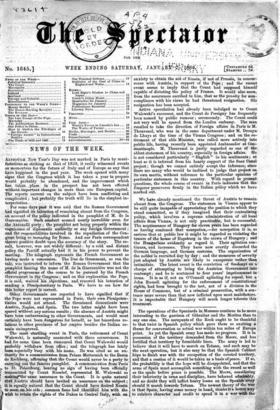We have already mentioned the threat of Austria to remain
absent from the Congress. The statesmen in Vienna appear to be still quite incapable of appreciating the position to which they stand committed, as if they imagined that their centralising policy, which involves a supreme administration of all local affairs from Vienna, is not only practicable, but is successful. The acquiescence of Hungary for eleven years has been regarded as having condoned that usurpation,—for usurpation it is' so serious that at public law it might be regarded as violating the tenure of the house of Hapsburg in the crown of Hungary ; and the Hungarians evidently so regard it. Their agitation con- tinues, and increases. They have now overtly discarded the German language, and German costume. The organization of the nobles is recruited day by day ; and the measures of severity just adopted by Austria are likely to exasperate rather than intimidate. The latest event is the conviction of Szedenyi on a charge of attempting to bring the Austrian Government into contempt ; and he is sentenced to four years' imprisonment in irons. It is as if, not an O'Connell agitating for repeal, but a John Russell agitating for the enforcement of constitutional rights, had been brought to the test, not of a division in the House of Commons, but of a criminal prosecution, with a sen- tence more severe than that now inflicted upon most malefactors. It is improbable that- Hungary will much longer tolerate this treatment.


























